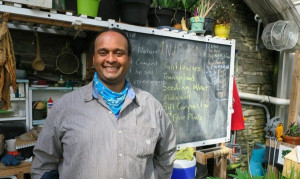When we began seeing news reports that Black Canadians (just like Black Americans and Black people in the UK) are facing disproportionate challenges and are at a larger risk to die of the virus, the expectation would be for the government to take the information seriously. This has brought the issue of race-based data into the national conversation on the virus and subsequent pandemic.
Data specifically disaggregated by race has been a pressing issue for Black community advocates for decades. Data is a cornerstone of any racial justice lens - without numbers, the information is downplayed or completely dismissed by the government. From education to policing, to health - the calls and cries for data are well documented.
Now that the topic of data is a life or death issue, some Canadian government officials have gone on record to discount it. On Apr. 9, Robert Strang, Nova Scotia’s Chief Medical Officer, claimed that the social determinants of Black health should not be focused on at this time and that “We can focus on these issues later.” On Apr. 10, Ontario’s chief medical officer David Williams downplayed the importance of race-based data “unless there are certain risk factors in groups or areas.” Further, Williams said, “Right now we consider our main risk groups (to be) the elderly, those with other co-morbidities, regardless of what race they are. Regardless of race, ethnic or other backgrounds, they’re all equally important to us.”
This total mischaracterization of the effectiveness of Black data collection at this time, with blanket statements about treating all Canadians equally- is dangerous. It seems harmless that Williams is alluding to the ethic of equality, but this is ill-equipped to properly serve everyone’s needs because it assumes that everyone starts from the same place. Equity is much more useful, intentional, and fulsome. A fundamental characteristic of equity in practice is acknowledging privilege and attempting to dismantle it by providing different or extra tools to those who need it. If Canadian decision-makers are seeing proof that Black people in Canada are more susceptible to the fatal consequences of the virus, we can’t have them erasing that fact during this pandemic. If perspectives like this by officials who are meant to safeguard and protect all Canadians go unchecked, it will have devastating health outcomes for Black Canadians.
In 2017, the United Nations Working Group of Experts on People of African Descent released an illuminating report on its Mission to Canada. On health, in sections 64 and 65, the paper said that: 64. In general, African Canadians have poorer health outcomes and are less likely to avail themselves of health services than many other groups. Social factors, including poverty, unemployment, racism, and discrimination, increase the risk of illness and interfere with timely and equitable treatment. Thus, African Canadians experience a high and disproportionate level of chronic health conditions such as hypertension, diabetes, HIV and AIDS, cancers, mental health problems, and sickle cell disease. 65. Several factors contribute to these health disparities, including historic barriers to access and continuity of health care, long-standing systemic racism, low socioeconomic status, lack of cultural specificity in health education and underrepresentation of Black health professionals in the system.
“It's stunning to me that provinces across Canada are arguing that they care for everybody the same way and health services are applied equitably/equally. They seem to be no longer interested in the gestures they were making previously to COVID-19.” OmiSoore Dryden, Associate Professor in the Department of Community Health and Epidemiology at Dalhousie University, tells me. The lip service that Dryden is alluding to is a familiar aspect of Canadian racial justice. The dire socio-economic realities that Black Canadians face due to structural racism include over-incarceration, housing and job insecurity, and health disparities – it’s not a stretch to implicate our government’s complicity. Professor Dryden describes not only the urgency of disaggregated race data, but it’s crucial utility at this time. And data cannot be collected in vain and without context. “I’m worried that data collection will not be nuanced and that it will be yet another avenue to pathologize. I’m wondering how Black people have access to and control over the data collected, so it becomes a work of justice. If we have race-based data, we need to understand the social determinants of health as racism and not race. Then we can see where health disparities lay. We have to work against the ease with which racism will inform the truth of what the information is. With the information, we need to have epidemiologists and biostatisticians who can understand the ways that systems of racism inform the statistical realities with an understanding that numbers are also culturally produced,” Dryden says.
We know how bad things can get here. Despite the inaccurate and ahistorical rumor that conditions of Black people in Canada are markedly different than the US, in this crisis, the similarities cannot be overstated. That is to say, when our government sees Black people dying in the United States from the virus, they cannot attempt to separate Black Canadians from Black Americans out of convenience and outright erasure. Further, any reasoning that attempts to parse out the differences in conditions falls flat because we often look to the US for trends, norms and economic leadership otherwise. The treatment of Black people is included if Canadians are actually interested in a better and more equitable society. As Beverly Bain, OmiSoore Dryden and Rinaldo Walcott point out, “Claims of colour-blind health care and approaches to the COVID-19 pandemic are concerning. The data from elsewhere, including the United States and the United Kingdom, sounds an alarm for Canada. Emerging American data reveal that Black people are contracting the virus at higher rates and also are dying in higher numbers.”
We have to look to the US and the United Kingdom and the ways in which Black people have been dying disproportionately due to COVID-19. While the US collects race-based data, there is an incredible struggle by all levels of government to address it. The enormity of government neglect of Black Americans is not only well documented well documented but a shameful part of the fabric of the country, tracing back to slavery right to today. To demonstrate this, last summer, the New York Times undertook the 1619 Project, a series that examines the legacy of slavery and the institutionalization of racism in America. Similarly in Canada, we have scholars and historians who have documented Canada’s ill treatment of Black people, including Robyn Maynard’s 2017 book, “Policing Black Lives: State Violence in Canada from Slavery to the Present.
State by state, Black Americans have been dying at higher rates due to the virus, despite being a smaller population group. These devastating statistics are laid bare for the public to see, even notorious racist President Donald Trump unable to deny the disproportionality.
“Many of the people who work in personal support centres and long-term care homes are Black folks - they were not being provided with protective equipment, people started contracting COVID-19, people started being afraid to go to work- they were seeing what was happening with Black folks and racialized people globally,” Sané Dube, Policy & Government Relations Lead at Alliance for Healthier Communities, tells me. Dube worked on the Statement from Black Health Leaders on COVID-19’s impact on Black Communities in Ontario, released on Apr. 2, which aims to change this pandemic’s trajectory and bring a critical analysis and differential population health actions to our pandemic response.
The statement is signed in solidarity by over a dozen Black people with senior positions in community health, and supported by the wider community. The fourth paragraph of the statement elucidates her point about specific concerns around Black essential workers, stating: “Black workers, (particularly Black women), are over-represented in front-facing service provider roles, including among PSW and RPN’s. Many are providing essential services, yet unable to access support for their families. These factors will exacerbate precarity, food insecurity, isolation and mental health concerns.”
Dube hopes there is enough momentum around race-based data collection now and hopes the opportunity will not be missed, citing the City of Toronto’s recent changes to their data collection system. And on May 6th, Ontario announced that it will start to collect race-based data to combat COVID-19.
Like much critical race scholarship and organizing work, addressing the issues that specifically apply to Black people will help everyone. Appearing on CBC’s Metro Morning on April 20th, Dr. Kwame McKenzie of the Wellesley Institute, CAMH and University of Toronto and Angela Robertson, Executive Director of the Parkdale Queen West Community Health Centre, explain how crucially important the collecting of this information is for Black and racialized Canadians. Citing the fatal statistics in the US and UK, McKenzie stresses that we need to get ahead of this, and that we are all connected, stating “A poor response to one part of the community undermines the response for everyone and puts the whole population at risk.. if we have communities that are at high risks and we don’t have the right resources, when we flatten the curve we can get recurrence with communities not properly served.” Robertson warns about risk of inaction on race-based data collection- that there will be a significant impact if we do not directly identify disproportional health outcomes to Black and Indigenous people, and we will repeat the past where “Black experience gets reduced to anecdotes, can be easily dismissed and not used to plan strategies and deployment of resources, and the creation of services to respond to local and geographic needs. Different communities need to be enabled differently to recover equally.”
It is clear that we need our governments to act on this. The collection of disaggregated race data must be handled with the same urgency as social distancing and isolation in order to get through this crisis with as minimal death as possible.
Melayna Williams is a legal-educated, anti-racism advocate, writer and podcaster. Her work is grounded in community mobilization, social justice, critical race theory and intersectional feminism. She has worked in human rights law, education law, alternative dispute resolution and sexual assault crisis response. She hosts Black Tea on Frequency Podcast Network and her work has appeared in Macleans, Flare, Vice, Photo District News, NOW Magazine and West End Phoenix.








